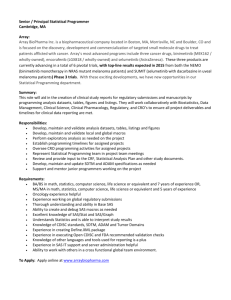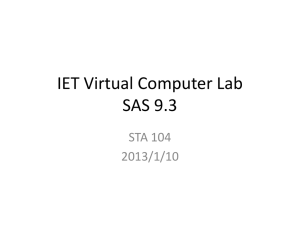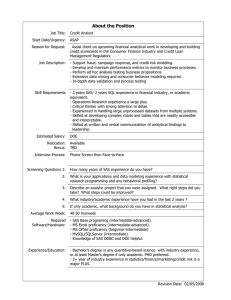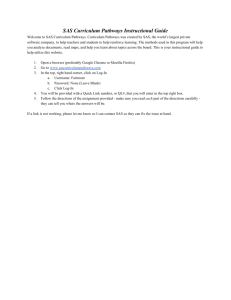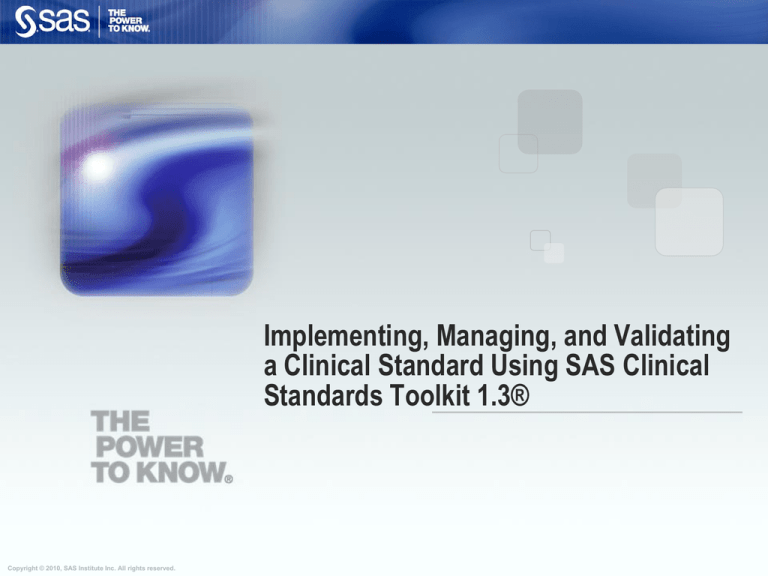
Implementing, Managing, and Validating
a Clinical Standard Using SAS Clinical
Standards Toolkit 1.3®
Copyright © 2010, SAS Institute Inc. All rights reserved.
SAS Clinical StandardsToolkit
What is SAS Clinical Standards Toolkit?
SAS CST Framework
Metadata Files
Supported Standards
Validating the SDTM Standard
Future Functionality
More Information
Copyright © 2010, SAS Institute Inc. All rights reserved.
What is SAS Clinical Toolkit?
Focuses primarily on support of clinical research
activities.
Initially focusing on standards as defined by
CDISC, but not limited to CDISC.
A collection of “tools”, providing an initial set of
standards and functionality that will evolve and
grow with future updates and releases.
Designed as an integral part of Clinical Data
Integration (CDI), but is available to all SAS
users as open source SAS Macros.
Copyright © 2010, SAS Institute Inc. All rights reserved.
What is SAS Clinical Toolkit?
Can modify, but be careful! Macros!
CDISC models available 3.1.1 and 3.1.2 (November 2010)
Controlled Terminology 2008-08, 2010-03
CRT-DDS and define.xml capability
Completely customizable to fit various standards
Free with 9.1.3 and 9.2
Copyright © 2010, SAS Institute Inc. All rights reserved.
SAS Clinical Standards Toolkit Framework
Consists of two distinct pieces (default installation):
• The components that are installed as part of SAS Foundation
and shared files. (SAS Macros, Java JAR files, etc.)
− SASROOT:\ClinicalStandardsToolkitFramework\...
− SASROOT:\SASClinicalStandardsToolkitSDTM312\...
− SASROOT:\SASFoundation\9.2\cstframework\sasmacro
• The global standards library that the framework macros operate
on top of.
− C:\cstGlobalLibrary\...
Copyright © 2010, SAS Institute Inc. All rights reserved.
CST Framework – Global Standards Library
The Global Standards Library is created during installation. A
series of directories are created here:
• /metadata : contains data sets that have information about the
registered standard versions.
• /schema-repository : contains schemas for XML-based standards
that are supported
• /standards : contains directories for each of the supported
standards.
• /xsl-repository : contains directories and XSL files used in reading
and writing XML files.
Copyright © 2010, SAS Institute Inc. All rights reserved.
CST Framework – Global Standards Library
Example of default installation
of CST Global Library
installed on C: drive. This is
Toolkit 1.3
Copyright © 2010, SAS Institute Inc. All rights reserved.
SAS Clinical Standards Toolkit Framework
Some usage scenarios for the framework
• Initializing the global macro variables
• Referencing the default version of a standard
• Getting a list of installed standards
• Getting a list of files and data sets associated with a registered
standard
• Creating data sets used by the framework
• Creating table shells based on a standard
• Getting a copy of the reference metadata for a data standard
• Inserting information from registered standards into a
SASReferences file
• ….
Copyright © 2010, SAS Institute Inc. All rights reserved.
SAS Clinical Standards Toolkit Framework
Getting a list of files and data sets associated with a
registered standard
When standards are registered so is the information about the files and data that
make up the standard. Use the following macro call.
%cst_getStandardSASReferences( _cstStandard=CST-FRAMEWORK,
_cstStandardVersion=1.2,
_cstOutputDS=sasrefs);
Copyright © 2010, SAS Institute Inc. All rights reserved.
SAS Clinical Standards Toolkit Framework
Creating data sets used by the framework
Allows the user to create table shells used by the Toolkit, useful if creating a new
standard. Use the following macro call.
%cst_CreateDS( _cstStandard=CST-FRAMEWORK,
_cstStandardVersion=1.3,
_cstType=control,
_cstSubType=reference,
_cstOutputDS=work.sasrefs);
The type and subtype identify it as a SASReferences table
Copyright © 2010, SAS Institute Inc. All rights reserved.
SAS Clinical Standards Toolkit Framework
Creating table shells based on a standard
Data standards, like SDTM, have reference metadata that describe the tables
and columns making up the standard. To create table shells using this
metadata, use the following macro call.
%cst_createTablesForDataStandard( _cstStandard=CDISC-SDTM,
_cstOutputLibrary=work);
This creates the SDTM tables/domain shells depending on the default version of
SDTM (3.1.1 or 3.1.2).
Copyright © 2010, SAS Institute Inc. All rights reserved.
SAS Clinical Standards Toolkit Framework
Framework Maintenance Macros
%cst_registerStandard()
%cst_setStandardVersionDefault()
%cst_unregisterStandard()
There are 16 SAS Framework macros (%cst_)
Copyright © 2010, SAS Institute Inc. All rights reserved.
SAS Clinical Standards Toolkit Metadata
Toolkit provides and uses a series of metadata files to
support basic core functions of the toolkit.
Standards
Validation_Master(Validation_Control)
StandardSASReferences
Reference_Tables (Source_Tables)
Standardlookup
Reference_Columns (Source_Columns)
SASReferences
Validation_Metrics
Properties
Validation_Results
Messages
Copyright © 2010, SAS Institute Inc. All rights reserved.
SAS Clinical Standards Toolkit Metadata
Standards data set is used to store information about a
standard version. One stored in the cstGlobalLibrary
standards area for each standard and one stored
containing all standards in the cstGlobalLibrary
metadata area.
Copyright © 2010, SAS Institute Inc. All rights reserved.
SAS Clinical Standards Toolkit Metadata
StandardSASReferences is identical in structure to
sasreferences, however has complete data.
StandardSASReferences is used to “fill in the spots”
when sasreferences has missing information. One
stored at the standards level and one at the metadata
level that contains all standards.
Copyright © 2010, SAS Institute Inc. All rights reserved.
SAS Clinical Standards Toolkit Metadata
The SASReferences data set is the “brain center” of the
Toolkit. Used to tell Toolkit where things are located.
Can be created by the user or generated through the
Toolkit. Many users will create their own SASReferences
data set. Further discussion later.
Copyright © 2010, SAS Institute Inc. All rights reserved.
SAS Clinical Standards Toolkit Metadata
Property files (i.e initialize.properties) set default
preferences for each process. Properties are a
series of name-value pairs that are translated into
global macro variables available for the duration of a
Toolkit process. Invoked by the cst_setProperties
macro.
Copyright © 2010, SAS Institute Inc. All rights reserved.
SAS Clinical Standards Toolkit Metadata
Messages data sets are used to store information about the
framework and standards validation checks. There are
framework messages (CST prefix) and standards
validation messages (e.g SDTM prefix)
Copyright © 2010, SAS Institute Inc. All rights reserved.
SAS Clinical Standards Toolkit Metadata
Results data set. Each Toolkit process generates a results data
set that can optionally be persisted beyond the SAS session
based on SASReferences data set settings. Each results
data set captures the outcome of specific process actions,
using the messages data sets to standardize output.
Copyright © 2010, SAS Institute Inc. All rights reserved.
SAS Clinical Standards Toolkit Metadata
Validation_Master & Validation_Control
Validation_master contains ALL standard specific
validation information. Validation_control contains
study specific validation information and is created
from validation_master. The “brain center” of the
Toolkit validation process. Will discuss later.
Copyright © 2010, SAS Institute Inc. All rights reserved.
SAS Clinical Standards Toolkit Metadata
Reference_Tables & Source_Tables
Reference_tables contains ALL standard specific table/
domain information. Source_tables contains study specific
table/domain information and is created from
reference_tables. Determines tables to be validated. For
SDTM, information is gathered from the CDISC SDTM
Implementation Guide.
Copyright © 2010, SAS Institute Inc. All rights reserved.
SAS Clinical Standards Toolkit Metadata
Reference_Columns & Source_Columns
Reference_columns contains all standard specific table/domain
column information. Source_columns contains study specific
table/domain column information and is created from
reference_columns. Determines columns to be validated. For
SDTM, information is gathered from the CDISC SDTM
Implementation Guide.
Copyright © 2010, SAS Institute Inc. All rights reserved.
SAS Clinical Standards Toolkit
Supported Standards
Toolkit 1.3 shipped with:
CDISC-SDTM 3.1.1
CDISC-SDTM 3.1.2
CDISC-CRTDDS 1.0
CDISC-Terminology 200810
CDISC-Terminology 201003
Focus Area (For 1.2 users)
CDISC-Terminology 201003
CDISC-SDTM 3.1.2 Domains
Copyright © 2010, SAS Institute Inc. All rights reserved.
Validation of SDTM
Open a SAS session with toolkit installed
Open validate_data from SDTM sample study
Submit
Copyright © 2010, SAS Institute Inc. All rights reserved.
Validation of SDTM
Runs successfully
No errors or warning detected in the log
Open validation_results data set in the results library
Review the checks
Copyright © 2010, SAS Institute Inc. All rights reserved.
Validation of SDTM
So, what drives this??
“Driver” program (validate_data.sas)
SASReferences data set (the “brain center” of the Toolkit
Validation_control data set (the “brain center” of the validation
process)
Source Data – the actual study data
Source Metadata
− Source_tables, Source_columns
Reference Metadata
− Reference_tables, Reference_columns
Messages Data
Copyright © 2010, SAS Institute Inc. All rights reserved.
Validation of SDTM
Driver programs
Toolkit is shipped with driver programs to facilitate
Toolkit processes outside of CDI
Located in the sample study as validate_data.sas
Initializes information vital to the macro calls
Runs in base SAS
Modifiable by the user for other standards or studies
17 Driver programs shipped with Toolkit 1.3
Copyright © 2010, SAS Institute Inc. All rights reserved.
Validation of SDTM
Validate_data.sas
%let studyRootPath=!sasroot/../../SASClinicalStandardsToolkitSDTM312/1.3
/sample/cdisc-sdtm-3.1.2/sascstdemodata;
%let _cstSetupSrc=SASREFERENCES;
%let workPath=%sysfunc(pathname(work));
%let _cstStandard=CDISC-SDTM;
%let _cstStandardVersion=3.1.2;
%SDTM_VALIDATE; (same as used by CDI)
Examples above are from a snippet of code within validate_data.sas
Copyright © 2010, SAS Institute Inc. All rights reserved.
Validation of SDTM
SASReferences data set
The roadmap and “Brain Center” for any Toolkit process
At this point all required fields must be populated
Copyright © 2010, SAS Institute Inc. All rights reserved.
Validation of SDTM
Validation_control data set
Study level
Controls the validations being submitted to the Toolkit
− The “Brain Center” for the validation checks
Derived from validation_master data set
Allows the user to pick and choose the validations needed to
implement.
Modifiable by the user.
Copyright © 2010, SAS Institute Inc. All rights reserved.
Validation of SDTM
Validation_control data set
The control center for the validation process
Copyright © 2010, SAS Institute Inc. All rights reserved.
Validation of SDTM
Domains/data sets to which check applies
Determines tables to process (&_cstDSName)
Conventions – what can be used is macro specific
−
−
−
−
−
−
−
−
_ALL_
SUPP**
CLASS:FINDINGS
TS
_ALL_-DS-LB-PC
CE+CM+SU
[DM][DS]
[_ALL_-DM][DM]
Copyright © 2010, SAS Institute Inc. All rights reserved.
All domains/tables
All SUPPAE, SUPPLB, etc.
All Findings domain classifications
Single domain
All domains EXCEPT DS, LB, and PC
Three domains CE, CM, & SU
Paired - check values from DM with DS
Paired – check all except DM against DM
Validation of SDTM
Columns to which check applies
Determines the column(s) to process (&_cstColumn)
Conventions – what can be used is macro specific
−
−
−
−
−
_ALL_
**DUR
TSPARM
**DY+**STDY+VISITDY
[**STDY][**ENDY]
All columns
Prefaced with domain name (AEDUR, etc)
Single column
Three columns DMDY, SVSTDY, & VISITDY
Paired - check values from AESTDY with AEENDY
Use source metadata - if Y uses Source_Tables,
Source_Columns (Study Level)
Copyright © 2010, SAS Institute Inc. All rights reserved.
Validation of SDTM
SAS Macro Module Name
14 cstcheck_* validation SAS macros
This column directs which macro will be used per edit
check
May require Code Logic:
− At the statement level
− At the data step (or proc sql) level
− May not
Copyright © 2010, SAS Institute Inc. All rights reserved.
Validation of SDTM
Source_tables data set
Study level
Determines which domains/tables are available for validation
Derived from reference_tables data set
Allows the user to pick and choose the tables to run against
Modifiable by the user.
Copyright © 2010, SAS Institute Inc. All rights reserved.
Validation of SDTM
Source_tables data set
Contains Study tables
Validates the standard – if not here will not be submitted
Copyright © 2010, SAS Institute Inc. All rights reserved.
Validation of SDTM
Source_columns data set
Study level
Determines which columns are available for validation
Derived from reference_columns data set
Allows the user to pick and choose the columns to run
against
Modifiable by the user.
Copyright © 2010, SAS Institute Inc. All rights reserved.
Validation of SDTM
Source_columns data set
Contains Study columns
Validates the standard – if not here will not be submitted
Copyright © 2010, SAS Institute Inc. All rights reserved.
Validation of SDTM
Source Data – The actual study data
SRCDATA libname
Sample data for this example
C:\Program Files\SAS\SASClinicalStandardsToolkitSDTM312\
1.3\sample\cdisc-sdtm-3.1.2\sascstdemodata\data
Copyright © 2010, SAS Institute Inc. All rights reserved.
Validation of SDTM
Study
Domains
DM
Study
Metadata
Validation
Controls
(Validation_control)
Controlled
Terminologies
(ct201003)
Copyright © 2010, SAS Institute Inc. All rights reserved.
CM
AE
Table Metadata
(Source_tables)
Validation
Process
(sdtm_validate)
…..
Source data
(Study)
LB
Column Metadata
(Source_columns)
Results
Data
(validation_results)
Sasreferences
wraps all this
together
Results
Reporting
User Written
Post Processing
Validation
Results
Report
Validation of SDTM
Customization – Modifying a check
Validation_contol, Source_tables, Source_columns,
Messages.
Modify codelogic field
Modify columns and/or tables field if needed
Modify Source metadata if needed
Modify message in Messages data set if needed.
Test
Move to Validation_master if needed for other studies
Copyright © 2010, SAS Institute Inc. All rights reserved.
Validation of SDTM
Customization – Adding a check using existing macros
Validation_contol, Source_tables, Source_columns, Messages.
Locate similar edit and copy it within validation_control.
Assign unique check number.
Insert new information in codelogic field, columns, tables
Modify Source metadata if needed
Add new message to Messages data set.
Test
Move to Validation_master if needed for other studies
Copyright © 2010, SAS Institute Inc. All rights reserved.
Validation of SDTM
Two Report Macros now available
Validation Report – reports on validation checks
− Validation_results
− Validation_metrics
− Options available to the user
Metadata Report – information about the checks
−
−
−
−
Validation_control
Messages
Validation_stdrefs
Options available to the user
Copyright © 2010, SAS Institute Inc. All rights reserved.
Validation of SDTM – Validation Report
Open a SAS session with toolkit installed
Open cst_report.sas from sample study
Submit
Copyright © 2010, SAS Institute Inc. All rights reserved.
Validation of SDTM – Validation Report
Runs successfully
No errors or warning detected in the log
Reports display automatically in Results Viewer
Copyright © 2010, SAS Institute Inc. All rights reserved.
Validation of SDTM
Validation Report
Copyright © 2010, SAS Institute Inc. All rights reserved.
Validation of SDTM
Validation Report
Copyright © 2010, SAS Institute Inc. All rights reserved.
Validation of SDTM – Metadata Report
Open a SAS session with toolkit installed
Open cst_metadatareport.sas from sample
Submit
Copyright © 2010, SAS Institute Inc. All rights reserved.
Validation of SDTM – Metadata Report
Runs successfully
No errors or warning detected in the log
Reports display automatically in Results Viewer
Copyright © 2010, SAS Institute Inc. All rights reserved.
Validation of SDTM
Metadata Report
Copyright © 2010, SAS Institute Inc. All rights reserved.
Future
1.3
• SDTM 3.1.2
• Controlled Terminology 2010-03
• Reporting Tools
SDTM Validation Team
• Hoping to consolidate SDTM 3.1.2 validation rules by November 2010
Post 1.3 – Looking at the following
• ODM 1.3.1
• ADaM
• Beyond CDISC – HL7
• Reactive to users thru Forum, Product Management, Tech Support, Me
• Our customers can influence any of this – be vocal
Copyright © 2010, SAS Institute Inc. All rights reserved.
CST information available from support.sas.com
http://support.sas.com/rnd/base/cdisc/cst/index.html
Availability of updates will generally be posted to the SAS
Clinical Trials Forum, available at:
http://support.sas.com/forums/forum.jspa?forumID=9&start=0
SAS 9.1.3 Download Site for Clinical Standards Toolkit
http://ftp.sas.com/techsup/download/hotfix/12clintlkt.html
Copyright © 2010, SAS Institute Inc. All rights reserved.
Periodic product updates and preproduction downloads will be
available at:
http://support.sas.com/rnd/base/cdisc/cst/preproduction.html
Currently available downloads include the following zip files:
CSTReporting92.zip (SAS 9.2 Reporting package)
CSTReporting913.zip (SAS 9.1.3 Reporting package)
CSTSDTM312_92.zip (SAS 9.2 CDISC-SDTM 3.1.2 metadata and domain templates)
CSTSDTM312_913.zip (SAS 9.1.3 CDISC-SDTM 3.1.2 metadata and domain templates)
CSTCT201003.zip (CDISC-Terminology-201003 format catalog and data set of CDISC
controlled terminology)
Copyright © 2010, SAS Institute Inc. All rights reserved.
Questions?
Contact information:
Gene Lightfoot
00-1-919-531-3103
Bill J. Gibson
00-1-919-531-0996
Gene.lightfoot@sas.com
billj.gibson@sas.com
(Development)
(Product Management)
© 2007,
SAS
Institute
Inc. All rights reserved.
Copyright © 2010, Copyright
SAS Institute
Inc. All
rights
reserved.

